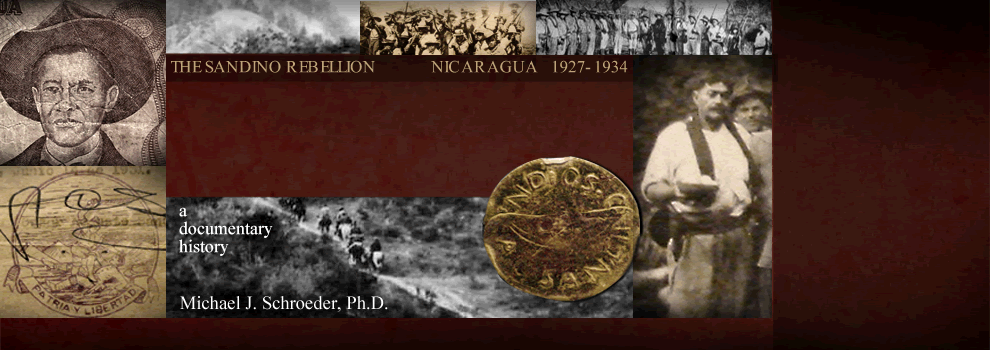|


|
|
M —
D O C S: M I S C E L L
A N E O U S D O C U M
E N T S |
|
thru 1927 |
1928 |
1929 |
1930 |
1931 |
1932 |
1933 + |
|
1
|
2
|
3
|
4
|
5
|
6
|
7
|
8
|
9
|
10
|
11
|
12
|
1
2
3
4
5
6
7
8 9
10 |
1
2
3
4
5
6 |
7
8
9
10
11
12 |
1 2 3 4 5 6 |
7 8 9 10 11 12 |
1 2 3 4 5 6 |
7 8 9 10 11 12 |
1 2 3 4 5 6 |
7 8 9 10 11 12 |
1 2 3 4 5 6 |
7 8 9 10 11 12 |
1 2
3 4 5 6
7 8 9 10 |
|
THIS IS THE FIRST
PAGE of the M-DOCS
(Miscellaneous Documents) pages, covering the period from
February 1910 to
January 1, 1917.
This website project is indebted to Mr. Brandon
Ray, Summa Cum Laude college graduate
from Ashford University in Iowa (with a B.A. in
History and a minor in Political Science) for
his meticulous transcriptions on this and many
other pages.
Critical introduction forthcoming.
|
|
|
|
|
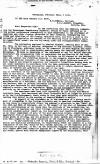
|
1. February 22, 1910.
G. E. Rourk, et al., Matagalpa, to Rear Admiral
W. W. Kimball, Corinto, p. 1.
[REPRODUCED AT THE
NATIONAL ARCHIVES] ¶ "Matagalpa, February
22nd, / 1910. ¶ TO THE REAR ADMIRAL U.S. NAVY, ¶
W.W. KIMBALL, Retired, ¶ U.S.S. ALBANY,
Flagship, ¶ Corinto, Nic. ¶ Most Respected SIR:-
¶ In the conviction that the Admiral, commanding
the Nicaraguan Expedionary [Expeditionary]
Squadron, should be fully informed as to the
actual occurrences transpiring in this
Department to the detriment of American and
other foreign interests of this locality,
endangering the lives and liberties of the
foreign residents here, and with a view to the
necessity of apprising the Admiral of the
existing state of affairs here, we respectfully
submit him the following clear and
straightforward communication. ¶ The expression
employed by Admiral Kimball, bearing date of
Jan. 22, 1910, in his note of warning, addressed
to the American citizens, residing in Nicaragua,
published later in “El Comercio” in both English
and Spanish, has given rise to considerable
anxiety among the American residents of
Matagalpa. WE have no knowledge of the existence
of any “so called American interests” and
consequently fail to comprehend the application
of the term employed. It is impossible for us to
believe, as is claimed by the Natives, that the
Admiral was referring directly to the property
rights and other interests of American residents
of this Department, which interests have all
been legally and properly acquired, all
requisite formalities having been in all cases
undergone in accordance with the laws governing
same, all legal requirements having been
necessarily complied with to obtain absolute
ownership, as defined and governed by the Law of
the land. ¶ The undersigned respectfully request
the Admiral to define the meaning or reference
of the expression “so called American interests”
used in his notice. We have been forced to take
this action by reason of the effect which has
been produced upon the Civil and Military
authorities of this place, and upon the public
in general, through their interpretation of the
message. Their conception of the meaning of the
notice, is resulting in the manifestation of a
sentiment, and the adoption of an attitude on
the part of the Natives, that is proving
extremely inimical to the security of American
rights and interests in this Department. Only
since the publication of the Admiral’s notice,
has the expression “Death to the foreigners”
been shouted publicly on the streets, by the
Government troops and their officials. ¶ The
Americans have been told repeatedly by the
troops and Native residents here, that Americans
and their interests will no longer be protected
by the U.S. Government; their claim is that they
have authority for entertaining this belief in
the wording of Admiral Kimball’s notice. ¶ In
support of our statement as to the existence of
a strong sentiment of antagonism to the foreign
interests and to American residents here, we beg
leave to respectfully direct the Admiral’s
attention to the “Ibis” of the 13th and 20th of
February, and to “El Bombo” of the 21st of
February, 1910, and in corroboration of our
claim that the attitude of the authorities, so
prejudicial to American and other foreign
interests here, as shown by their recently
adopted policy toward us, has been made most
manifestly patent to us by their commitment of
acts of the most malicious intent, constituting
an aggravated form of persecution, in flagrant
violation of the letter of exemptions given in
writing, and the promises of their spoken and
written word, even when signed by the chief
executive of the ruling faction, Jose Madriz. ¶
To particularize a few of the many instances of
this unwarranted, wanton and malicious
persecution, we respectfully refer the Admiral
to a contemplation of the few, which we will
hereby specify, of the numerous acts of
violation of property, to wit: On two occasions
flagrant violations of property rights have been
committed against Mr. A. Sullivan, on which
occasions his doors, posted with written
exemptions signed by the authorities, were . . .
"
|
|
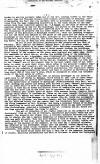
|
2.
February 22, 1910.
G. E. Rourk, et al., Matagalpa, to Rear Admiral
W. W. Kimball, Corinto, p. 2.
" . . . broken
in and his servants taken out or run off,
leaving coffee to the value of more than Six
Thousand Dollars Gold without protection or
security, notwithstanding the fact that his
servants were in possession of written
exemptions from the same commanding authorities
at the time; abuses of the same nature have been
committed against Mr. G.E. Rourk, in the face of
written exemptions obtained by him for his
buildings, and pasted on the doors. In short
nearly all the Americans here have suffered more
or less in this manner. Two violations of
property and all other rights have been
committed on the property of The Minnesota &
Nicaragua Coffee Co., when the invading
trespassers cut the wires and smashed in the
gates of the place and the doors of the
buildings in the middle of the night, indulged
in the diversion of discharging firearms all
over the premises, and either captured or ran
off all his working force, for all of whom had
been secured exemptions from molestation. ¶ An
act of most malicious persecution was
perpetrated the 19th of February, 1910, against
the Messrs. Potter Bros., on which occasion
their plantation was entered by an armed force,
their buildings surrounded, about one hundred
rifle shots fired, some of which passed through
the buildings, the force of invaders even firing
on the women who were endeavoring to escape,
about twenty of the workers on the place were
captured and taken away, while the remainder of
about thirty, as also the working force of the
adjoining property owned by Mr. L. Boedeker,
were frightened off. The malicious intent of the
act last cited will be better appreciated by a
knowledge of the fact that the places of the
Messrs. Potter and Mr. Boedeker, situated as
they are in the “Arenal” are at the present time
in the most urgent need of all their help, in
order to pick their crops, which owing to the
peculiar climatic characteristics of that
locality, are the latest in ripening and last to
be harvested in the schedule of Matagalpa coffee
plantations. The respective owners of these
last-named plantations cannot now hope to
succeed in harvesting more than about 25% of
this year’s crop, which is estimated at about
six thousand sacks of the best grade of coffee.
¶ When Mr. G.E. Rourk was sent as special
messenger by our Consular Agent here to our
Consul in Managua, there being at that time no
other means of communication, he carried
safe-conduct passports from our Consular Agent
and the authorities in command of Matagalpa.
Notwithstanding this fact, and after showing his
papers and having been allowed to pass, General
Portocarrera sent an armed force of five to
apprehend him and bring him back. This force
failing to take him an armed and mounted force
of twenty-five were sent to take him and shoot
him on the road, and to represent that he had
been shot while stealing past picket posts at
night. This measure having likewise failed
through being unable to overtake Mr. Rourk on
the road, General Portocarrera gave orders to
ambush and shoot Mr. Rourk and anyone who might
accompany him on his return trip from Managua.
On the return trip Mr. Rourk was accompanied by
Mr. Jose de Olivares, our American Consul, and
the intended assassination was not effected
solely for the reason that the travellers first
came upon the force commanded by Col. Tijerino,
who being a personal friend of Mr. Rourk and
unwilling to carry out orders to assassinate
which he may have received from Portocarrera,
provided a body-guard for Mr. Olivares and Mr.
Rourk and had them escorted through the lines to
safety. ¶ The act of violation of all rights
committed on the premises of the Foreigners’
Club on the 8th of February, manifested
particular venom and malignancy. The property
was broken into, a forcible entrance effected
and the boy in charge, who had a special
exemption as administrator of the Foreigners’
Club was made prisoner. This was done without a
word of warning to any of the sixty members of
the club, and was done when the club was closed,
taking advantage of the absense [absence] of the
members. On the same day a forcible entrance was
effected by the Government troops into the
general coffee depository of the foreigners;
these troops captured the men in charge, and
left the place abandoned, with Fourty [Forty]
Thousand Dollars Gold worth of coffee on the
premises. ¶ The above cited cases are only a
very few of the numerous instances of abuses,
malicious persecutions and acts of violence to
which the foreigners . . . "
|
|
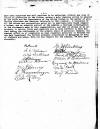
|
3.
February 22, 1910.
G. E. Rourk, et al., Matagalpa, to Rear Admiral
W. W. Kimball, Corinto, p. 3.
" . . . have been subjected and will continue to
be subjected, without any hope of relief or
protection in the future, unless a more vigorous
policy be adopted by the State and War
Departments of the United States in the matter
of protecting Americans and American interests
in this country. A recountal of all the abuses
and persecutions meted out to Americans here
would compose a volume, and we ernestly
[earnestly] solicit of the Admiral a thorough
investigation of the statements made in this
communication, and that he extend us an
opportunity to relate, fully and completly
[completely] all we have suffered to date and
that during the continuance of the present state
of political turmoil, the Admiral afford us or
commission us some competent authority to
witness for the Navy Department the further
probable occurrences in Matagalpa of acts of
violence and abuse. With all due respect for the
Admiral, we are, most sincerely, ¶
[signed] P.C. Rourk, J. Hawkins ¶ S. C.
Richardson, W. H. DeSavigny ¶ Alejo Sullivan,
Frank A. Sweetser ¶ A. B. DeSavigny, William B.
Richardson ¶ Arthur Werrar, Raymond M. Hawkins ¶
N. Delany, Guy E. Rourk ¶ A. Frauenberger, Grey.
Weimar ¶ Elisio R. Macy "
|
|
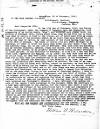
|
February 23, 1910.
William B. Richardson, Matagalpa, to Rear
Admiral W. W. Kimball, Corinto.
"Matagalpa, 23 of
February, 1910. ¶ TO THE REAR ADMIRAL U.S. NAVY,
¶ W.W. Kimball, Retired, ¶ U.S.S. Albany,
Flagship, ¶ Corinto, Nic. ¶ Most Respected SIR:-
¶ On the 11th day of February, 1910, the forces
of the Government, under the command of Generals
Lara and Chavarria, took possession of my Cattle
Ranch, “Abay”, and occupied said place, until
the morning of February 16th, during which time,
they killed from ten to fourteen head of cattle
to feed to the troops, all of which were from my
place, and all cattle of the Holstein breed. By
my count they have killed in all thirty-two head
of cattle, my last account of the stock having
been taken on the 15th of January. The heads of
twenty cows are still in sight in my pastures.
In order to enter the place they broke the door
where I had left the American flag, put up the
11th of February. They took from the building
all my kitchen utensils, saddles, ropes and
lassos, and took with them, six mules and two
horses, of my property besides three riding
animals belonging to other parties. On the
fifteenth of February, at 6.30 A.M. I met the
Generals Lara, Chavaria [Chavarria] and Ramirez,
at my place, and they said they had killed my
cattle only, as they were closer than any
others, and that they would be paid for in full
upon the presentation of my account to the
Government. ¶ I have advised the President of
the Republic of my loss, who has answered me,
promising that everything would be settled. The
loss of my cows which would soon be fresh with
calves, cannot be replaced, as they would have
given me milk during the dry season. The damage
done to the fences, corrals, houses and pastures
is heavy and to all this there are many
witnesses, both natives and foreigners, as the
place is only half a league from Matagalpa, and
on the main road. Acting on the promise of
President Madriz, I have invited the Political
head of this Department, and the Chief of
Police, the two highest political authorities of
Matagalpa, to name a competent person to
investigate my losses and appraise the value of
same, which they have refused to do, or take any
recognition of, stating that the troops couldn’t
have molested any foreigner’s property. I have
refrained from making any note of the losses I
have sustained in the document which the
Americans in a body have addressed to the
Admiral, for the reason that until a late hour
today, upon the refusal of the authorities here
to take any cognisance of my loss, there had not
been manifested any spirit of malignant intent
in my case, as every one appealed to in the
matter had given me every assurance that my
losses would be recognised and settled for in
full. Since I have been unable to get the
authorities to even arrange for an equitable
appraisement of my loss, their determination to
ignore my claims and avoid making payment for
same is only too apparent and on a par with the
policy they have pursued throughout with the
Americans and other foreign residents of
Matagalpa. ¶ With all due respect and
consideration for the Admiral, I am, ¶ Very
Truly Yours, ¶ William B. Richardson"
|
|
1912
|
|
|
|
|
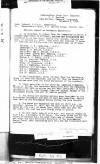
|
1.
November 2, 1912.
Report on Matagalpa Expedition. USMC Colonel J. H. Pendleton, Managua, to
Admiral W. H. B. Southerland,
Commander-in-Chief, U.S. Pacific Fleet, Corinto,
p. 1.
"Headquarters
First Prov. Regiment, ¶ U. S. Marines, ¶ Camp
Weitzel, Managua, Nicaragua, ¶ November 2, 1912.
¶ From: Colonel, U.S.M.C., Commanding. ¶ To:
Commander-in-Chief, U.S. Pacific Fleet, Corinto,
Nic. ¶ Subject: Report on Matagalpa Expedition.
¶ 1. In obedience to orders from the
Commander-in-Chief, a mounted expedition of
officers, marines and bluejackets was assembled
at La Paz Viejo, coming from Granada, Managua
and Leon, on October 18, 1912. This party was
composed of seven (7) officers and thirty-four
(34) enlisted men, as follows: ¶ Colonel, J. H.
Pendleton, U.S.M.C. ¶ Paymaster T. H. Hicks,
U.S.N. ¶ Major S. D. Butler, U.S.M.C. ¶ 2nd
Lieut. Ray S. Geiger, U.S.M.C. ¶ 2nd Lieut.
Alfred McC. Robbins, U.S.M.C. ¶ 2nd Lieut.
George C. DeNeale, U.S.M.C., ¶ Ensign H. C.
Train, U.S.N. ¶ One (1) Hospital Steward, U.S.N.
¶ Two (2) Sergeants, U.S.M.C. ¶ Three (3)
Corporals, U.S.M.C. ¶ One (1) Trumpeter,
U.S.M.C. ¶ Nineteen (19) Privates, U.S.M.C. ¶
One (1) Boatswain, Mate, U.S.N. ¶ One (1)
Coxswain, U.S.N. ¶ Six (6) Seamen, U.S.N. ¶ Of
the bluejackets, three (3) were from the
California, three (3) from the Colorado, and two
(2) from the Annapolis. The Marines were from
the three battalions of the regiment. ¶ 2. There
were also in the party Mr. Ignatius O’Reardon,
Mr. J. A. Willey, two Americans acquainted with
the Matagalpa district, who came as guides and
who were invaluable in their assistance to us,
also Colonel Diaz and Colonel Vargas of the
Nicaraguan Forces, and six (6) native packers. ¶
3. The riding and packing animals were furnished
by the Nicaraguan Government and were in very
bad condition, having been used by the
Nicaraguan troops during the late trouble. ¶ 4.
The start for Matagalpa was made at 12:30 p.m.,
on Saturday, October 19, 1912, and the day’s
march of 21 miles ended at 6:30 p.m., at Santa
Rosa, where camp was made for the night; the
road was good though rough in places. ¶ 5. We
left Santa Rosa at 8:30 a.m., and reached Panama
at 6:00 p.m., a distance of 25 miles. The times
given are for the column of mounted men; the
pack train was of course, later; but under the
most efficient direction of the pack-master,
Ensign Train, made remarkably good time and was
thoroughly well handled. . . . "
|
|
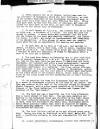
|
2.
November 2, 1912.
Report on Matagalpa Expedition. USMC Colonel J. H. Pendleton, Managua, to
Admiral W. H. B. Southerland,
Commander-in-Chief, U.S. Pacific Fleet, Corinto,
p. 2.
" . . . ¶ 6.
Fresh animals met us at Panama, having been sent
by the residents of Matagalpa; which was very
fortunate, as most of the animals furnished by
the Nicaraguan Government were in such shape
that they could not have finished the trip.
Mules were also sent by the Jefe Politico of
Jenatega [Jinotega?], but were not needed for
this part of the trip, so were sent to Matagalpa
for use on the return trip if necessary. ¶ 7. We
left Panama at 7:10 a.m., and reached Real de la
Cruz at 11:45 a.m., a distance of 17 miles. The
road was good but sticky in places. A young
steer was purchased here for beef for the troops
by our very satisfactory Commissary, Pay
Inspector Hicks, U.S. Navy, who acted as
Quartermaster and Commissary of the Expedition.
A fine stream of water near our camping place
gave the men an opportunity for bathing and
washing. ¶ 8. We left Real de la Cruz at 7:45
a.m., and marched to Sebaco, 14 miles, over a
fair road, soft in spots, reaching this place at
11:00 a.m. The column being fresh and the
weather fine, I decided to make the remaining 19
miles to Matagalpa after a rest of an hour and a
quarter. ¶ 9. The road from Sebaco to Matagalpa
was in good condition and we reached Matagalpa
at 4:45 p.m. We were met outside of the town by
the Jefe Politico and about 70 Americans and
other residents, all mounted; and after a most
enthusiastic, cordial reception, they escorted
us to the town where the men were quartered
comfortably in a Jefetura. The three senior
officers were quartered in the house of Mr.
Spencer C. Richardson, Acting U.S. Consular
Agent, and the four junior officers were
quartered in the lower floor of the Masonic
Temple, where rooms are provided by the local
lodge for the accommodation of their visiting
members. ¶ 10. On entering the town the
Nicaraguan flag was carried by a squad of
Nicaraguan soldiers at the head of the escort.
Our flag was carried at the head of the American
column by Sergeant Edward Townsend, with a color
guard consisting of Private John Kreager of the
Third Battalion, U.S. Marines and Seaman Dick
Neubauer of the “California”. ¶ 11. The next day
was a beautiful one till late afternoon, when a
heavy shower of rain fell. The men were swimming
and washing in the Matagalpa River and visiting
in the town, where they were cordially received,
and behaved unexceptionably, as in fact, they
did throughout the whole trip, thoroughly
satisfying every possible demand that could be
required of decent, honest American manhood – as
of course was to be expected of our bluejackets
and marines. ¶ 12. The Jefe Politico called on
me and offered every courtesy. During our stay
he furnished us with beef, water and fire wood
-- positively refusing to take any compensation
for any of these. ¶ 13. A most unfortunate
circumstance occured [occurred] this afternoon .
. . "
|
|
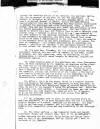
|
3.
November 2, 1912.
Report on Matagalpa Expedition. USMC Colonel J. H. Pendleton, Managua, to
Admiral W. H. B. Southerland,
Commander-in-Chief, U.S. Pacific Fleet, Corinto,
p. 3.
" . . .
through the tactless action of Mr. Emerson, the
American Gentleman, who is engaged in map work
for our War Department. He brought to Matagalpa
as guide, a certain Alfonso Valle, who has been
a so-called General of Rebels, during the late
trouble. Feeling against this man in Matagalpa
was very bitter, particularly amongst the
Americans and other Foreigners, whom, it was
reported, this man had threatened with death and
mutilation in case his forces succeeded in the
insurrection. The Jefe Politico wished to arrest
this man, but finding that he had a passport
from Colonel Long, I refused to allow this; but
as I was assured by the best element of the
American residents that this man’s presence was
extremely distasteful, and that they feared that
there might be at least a demonstration in the
city, I have him assylum [asylum] in the
barracks where my men were quartered, and, of
course, the best of treatment. This seemed
satisfactory to everybody concerned -- including
Mr. Emerson -- who expressed himself to me to
that effect. Mr. Emerson left the same morning
as ourselves. ¶ 14. The next day, Thursday, all
the officers except Second Lieutenant Robbins,
who was left in command of the camp, slightly
abraded, and four orderlies, rode, by
invitation, to the Leonese mine, a property
owned largely by American, English and
Australian capital. ¶ 15. After meeting some of
the Americans and other foreigners here, we were
conducted by Mr. Hawkins, an American coffee
planter, over one of his haciendas and had the
mysteries of coffee planting, growing and curing
explained to us. Following this came a banquet
at the mines, which approached a Roman feast in
the quantity, quality and diversity of its
viands -- the best of good feeling prevailed and
the action of the Commander-in-Chief in sending
this force of Americans to this district was
enthusiastically toasted and sincerely
applauded. ¶ 16. After a visit to the mines,
which is a cyanide proposition now dropping ten
stamps, and preparing to drop ten more, on what
seemed to be a well developed ledge of reputed
twelve dollar rock, we went to the manager’s
house for afternoon tea. After tea we divided
into four parties -- Lieutenant De Neale, who
had been detailed for the road sketching,
remained with Mr. O’Reardon, to do up the
finished sketch, which work proved very
satisfactorily performed. ¶ 17. Mr. O’Reardon
left us here, as the business which he had long
neglected, to do most valuable work for the U.S.
Forces, without thought of a reward, demanded
his attention. His stay with us had been most
pleasant, and his help in mapping and guiding
most cheerfully given and was invaluable in its
thoroughness. ¶ 18. The other parties -- Pay
Inspector Hicks and Second Lieutenant Geiger and
Colonel Diaz, went to Mr. De Savigney’s coffee
hacienda for the night, Major Butler and Ensign
Train went to that of Mr. Fromberger, and Mr.
Willey and I went to hacienda of Mr. Hawkins.
. . . "
|
|
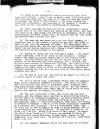
|
4.
November 2, 1912.
Report on Matagalpa Expedition. USMC Colonel J. H. Pendleton, Managua, to
Admiral W. H. B. Southerland,
Commander-in-Chief, U.S. Pacific Fleet, Corinto,
p. 4.
" . . . ¶ 19. After a
most delightful evening and night spent with
these good friends -- and it may be known, here,
that each party felt sure that they had the best
of it, and the next day tried to convince the
other to this effect -- the three parties
reunited and proceeded to the hacienda of Mr.
Spencer C. Richardson, where we were
delightfully entertained at luncheon. ¶ 20.
After luncheon we rode over to Mr. Richardson’s
place through some of the most beautiful scenery
in the world, and then over that of Mr. Guy
Rourk, and returned to Matagalpa, which most
picturesquely situated little city, we entered
just as “the sunset and moonrise were blended
into one”. ¶ 21. The next day was spent with our
new found friends of Matagalpa, and in the
evening a reception and ball was given in honor
of the visiting American officers. The
Foreigners Club was prettily decorated, and the
fact that about one hundred and twenty men and
ladies remained until three o’clock Sunday
morning testifies to the success of the affair.
¶ 22. Sunday we rested for the next day’s start
-- the weather was unsettled, with heavy rains
in the mountains. Between showers the American
Colony entertained us with unique horse racing.
The next morning we left for the return journey,
the weather in the meantime had been changing,
but I thought that we could make through by
Matapa and Tipitapa, thus avoiding the steamer
trip across Lake Managua -- Jefe Politico, the
Mayor de Plaza and at least forty or fifty of
the residents, native and foreign, mounted and
rode with us some four or five miles, where
goodbyes were said. ¶ 23. We left at 9:30 a.m.
and arrived at Sebaco at 2:30 p.m. 19 miles,
where we spent the night. ¶ 24. On the return
trip, Lieutenant Geiger took the mapping work,
under Lieutenant DeNeale’s tuition. The result
of this and other mapping work will be forwarded
later, together with some intelligence report
that may be of value. We left Sebaco at 7:40
a.m. and marched over heavy trails, which would
be very good in dry weather, to Matapa, 13
miles. ¶ 25. The rain continued to fall that
night and the next morning, and the streams were
reported as above fording height, and the trails
to Tipitapa impassable. As this condition might
last several days, I finally made the decision
to go by the San Francisco trail -- over the
mountains, 2800 feet, and thence by steamer to
Managua -- which is the route originally
discussed as a possible one of return. It is a
picturesque route, and the only one in that
direction to take in rainy weather, but it is
mountainous and very difficult. We arrived in
Trujillo, 14 miles, at 1:45 p.m., after five
hours of hard going. We spent the night here.
Leaving at 7:10 a.m., we marched 18 miles of
rough mountain trails and deep, sticky adobe,
llanos to San Francisco, in a heavy rain. We
arrived at 1:45 p.m., pack train about 2:40 p.m.
¶ 26. The steamer “Managua” which had been sent
by the Nica- . . . "
|
|
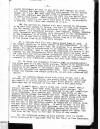
|
5.
November 2, 1912.
Report on Matagalpa Expedition. USMC Colonel J. H. Pendleton, Managua, to
Admiral W. H. B. Southerland,
Commander-in-Chief, U.S. Pacific Fleet, Corinto,
p. 5.
" . . . raguan
government to meet us and which left Managua at
10:30 a.m. reached San Francisco, without wood
enough for the return voyage, at 7 p.m. The rain
came down in torrents nearly all night, and
everyone was soaked to the skin for the second
time in twenty-four hours. After stopping at a
wood station until 9 a.m. and procuring one
small boat load of wood, we proceeded to
Managua, which place was reached at 11 a.m. ¶
27. The animals we started with were ordered by
telephone to be sent from Panama to Metapa, but
most of them were useless for the return trip
and were delivered to the Commandante of that
place. The remaining animals, from Granada,
Masaya, Managua, Leon, Matagalpa and Jinotega,
were delivered to the Commandante at San
Francisco, with orders to send all those
belonging to this side of the lake to Managua,
whence they will be returned to the places from
which they were brought. ¶ 28. I believe that
this trip did a great deal of good. It has
taught something to every member of the
expedition. It has shown the Nicaraguan people
that the American is a versatile personage, who
may be dependedupon [depended upon] to go
anywhere, at any time, if necessity demands. And
it has surely impressed the people of all
classes (as the Commander-in-Chief desired
should be done) with the idea that the United
States government does not intend longer to
tolerate Central American Revolutions, such as
have been almost constant in this distressed
country for more than twenty years. ¶ 29. We
found the Matagalpa district rich in
possibilities; the mines seem to be well worth
working. Coffee is an established industry; this
year’s crop should be a record one, probably
reaching 60,000 sacks of 100 pounds each.
Rubber, cocoa and sugar are successfully
experimented with. Corn, beans, oranges, lemons
and bananas are staple products, as are also
potatoes and onions. ¶ 30. The camping places
along both these routes, and I am informed on
the other routes, are mostly farms, whose
buildings are capable of giving shelter to about
fifty people; water and pasturage may be
obtained at them all, and a few provisions. ¶
31. A small party, half a dozen men, could
travel easily without rations. More than fifty
should carry shelter. An American force such as
is now contemplated to be left indefinitely in
Nicaragua, four hundred men, should have fifty
of the largest native horses for saddle animals.
These should be fully equipped and shod all
around; forty large native mules with full pack
equipments should be provided; these mules
should be shod all around and should be in
charge of an American packmaster, and the men of
the battalion should be exercised in riding,
packing and caring for these animals. It would
be well if all the animals were equipped for
pack purposes, so that the whole battalion could
march afoot, the animals packing the stores.
During the rainy season the roads are
impracticable for carts. The road from La Paz
Viejo is the best to take at any season. ¶ 32.
The untouched riches of this country could be
wonderfully developed by a railroad from La Paz
Viejo or from Momotombo. . . . "
|
|
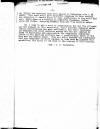
|
6.
November 2, 1912.
Report on Matagalpa Expedition. USMC Colonel J. H. Pendleton, Managua, to
Admiral W. H. B. Southerland,
Commander-in-Chief, U.S. Pacific Fleet, Corinto,
p. 6.
" . . . ¶ Mr. Willey
has surveyed from both places to Matagalpa with
a 2% grade. This road would give wonderful
progress to this country, and extending it
twenty miles of easy engineering to the north
and east, would open up a country of wonderful
richness; Coffee, cocoa and rubber, covering
between four and five million acres. ¶ 33. I
wish to add a word of commendation for all the
officers and men engaged on this expedition,
their cheerful demeanor under trying
circumstances was most noticeable, and their
readiness and adaptability would astonish anyone
who had not learned by years of experience and
association the remarkable characteristics of
the American military men -- particularly those
of the Navy and the Marine Corps. They all fully
deserve the confidence that the
Commander-in-Chief reposed in them when he
planned this expedition, the first of its kind
in the history of this country. ¶ (sgd.) J. H.
Pendleton."
|
|
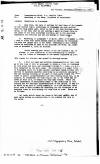
|
1.
November 14, 1912.
Admiral W. H. B. Southerland, off Corinto, to
the Secretary of the Navy, Washington, p. 1.
"UNITED STATES
PACIFIC FLEET ¶ U.S.S. CALIFORNIA ¶ Off Corinto,
Nicaragua, November, 14, 1912. ¶ From:
Commander-in-Chief, U.S. Pacific Fleet. ¶ To:
Secretary of the Navy, (Division of Operations)
¶ Subject: Operations in Nicaragua. ¶ 1. Upon
this, the date of sailing for San Diego of the
vessels of the Pacific Fleet, conditions in
Nicaragua are more settled than for many years
past, which is due to our late military
operations, to the fact that we are leaving a
small military force in the heart of the most
disturbed district, and to the excellent
impression our officers and men are making on
these people. ¶ 2. Referring to paragraph 7 or
my No. 229-C of November 4, 1912, I have to
state that after making clear my reasons for
recommending that the larger part of the force
remaining in this country should be stationed at
Leon to our Minister, he wrote me, under date of
November 6, 1912, as follows: ¶ “After reading
your letter of the 2nd instant I am, of course,
of your opinion as to the advisability of
retaining the forces in Nicaragua in the manner
suggested by you”. ¶ This places the Minister
and myself in thorough accord. ¶ 3. I will not
make any definite recommendation at this time as
to how long it will be necessary to retain a
force in Nicaragua as time alone can tell, and
Lieutenant Colonel C.G. Long, U.S.M.C., will
hereafter be the best judge. The retention of a
small force in Nicaragua until the newly elected
Government makes evident its ability to maintain
peaceful conditions is an absolute necessity.
The bad feeling existing on the part of each
party toward the other is almost
incomprehensible and this feeling could not, in
my opinion, be restrained for very long if all
of our force was removed at this time, or within
the very near future. While the State Department
is undoubtedly aware of the conditions in this
country and the peculiar characteristics of the
people, it may not be amiss on my part to invite
attention to a few salient facts which tend to
make evident the necessity for the retention of
an adequate force in this country for some time
to come. These are as follows: ¶ (a) Party
spirit takes the place of National spirit, men
of each party giving no consideration to the
country but only to the party. . . . "
|
|
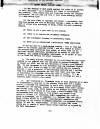
|
2.
November 14, 1912.
Admiral W. H. B. Southerland, off Corinto, to
the Secretary of the Navy, Washington, p. 2.
" . . . ¶ (b) The
feeling of each party against the other is so
bitter - in fact, malignant - as to dominate all
ideas of civilization and humanity - even family
ties are forgotten during the frequent
revolutions, and the rank and file of both sides
actually revert to a semi-savage type. ¶ (c) The
peon class is ignorant and brutal - practically
less than semi-savage and with no National
feeling - ready to take the part of either side
according to which offers the most promising
results. ¶ (d) There is not a good road in the
country. ¶ (e) There is no regular and permanent
newspaper. ¶ (f) The Government treasury is
practically empty. ¶ (g) There are no
educational institutions worth mentioning. ¶ To
sum up, this is a semi-savage country - more so
than any other of the Central American States -
and will remain so until its revolutionary
activities have ended, at which time its
exceptional natural resources, accompanied by
safety to life and property, will induce
foreigners (Americans, it is hoped) to take up
its lands and develop its great resources. ¶ 4.
The newly elected President is not a military
man and consequently is not popular with his own
party in Western Nicaragua. He is honest and
able, and has the reputation of being a good
business man. He has impressed me more favorably
than any prominent Nicaraguan I have met. There
are many in both parties who are honestly
anxious to see a cessation of revolutionary
activity and I believe they will gradually
recognize the fact that their only hope lies in
supporting the President during his term of
office. If I am correct in this supposition, we
may be able to withdraw all but a legation guard
within a few months. ¶ 5. The conditions in
Nicaragua being so much improved as to make it
inexpedient to keep all of the present force
here for a longer period, I informed the
Department by cable that, unless otherwise
directed, all the marines, except the stationary
force under Lieutenant Colonel Long, USMC, would
embark on the BUFFALO for Panama upon the
arrival of that vessel at this place - about
November 20th. All arrangements have been made
to this effect, and copies of my orders to
Colonel J.H. Pendleton, USMC, commanding the
force on shore in Nicaragua, and to Commander
W.J. Terhune, USN, the Senior Naval Officer
afloat at Corinto, directing said embarkation
and providing for the conduct of affairs
hereafter, are appended hereto, marked “A” and
“B”, respectively. It will be noted that these
orders are to remain in force “until either
modified or revoked by the Navy Department”. . .
. "
|
|
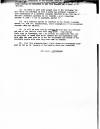
|
3.
November 14, 1912.
Admiral W. H. B. Southerland, off Corinto, to
the Secretary of the Navy, Washington, p. 3.
" . . . ¶ train
bearing the President to and from Managua had a
guard of 50 Marines. ¶ 12. In order to give some
slight idea of the influence for good which our
presence in this country has produced I append a
free translation of a farewell telegram received
by me from one of the most prominent Liberals in
the country - a Dr. Sebastian Salinas of Leon -
which is appended, marked “D”. ¶ 13. As a
possible matter of interest in the future I
append, marked “E”, and “F”, respectively, short
biographies of the so-called Generals Mena and
Zeledon. ¶ 14. It will be seen from my several
reports that the officers and men of the Pacific
Fleet have been kept quite busy during their
stay in Nicaragua, and I am certain the
Department will not be surprised to learn that
their conduct and the impression they have made
has been such as to win the confidence and
esteem of all reputable people with whom they
have come in contact. ¶ 15. With this
communication, I will close the Nicaraguan
incident as far as the vessels of the Pacific
Fleet are concerned. ¶ /s/ W.H.H. SOUTHERLAND. .
. . "
|
|
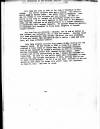
|
4.
November 14, 1912.
Admiral W. H. B. Southerland, off Corinto, to
the Secretary of the Navy, Washington, p. 4.
" . . . ¶ Luis Mena
was born in 1865 in the town of Nandaime in
Nicaragua. His father Inocente Mena was a
cobbler. His mother’s maiden name is Teresa
Uvado - she still lives in Nandaime. Luis was
the oldest of five brothers and six sisters. He
went to school in the city of Granada and
afterwards worked on a form [farm?] near
Nandaime. In his early manhood he went down to
the Atlantic coast and was employed as an
administrator of a banana plantation in
partnership with Segundo Chamorro. He married
Margarita Montiel, a Nicaraguan girl educated in
Costa Rica, daughter of General Eduardo Montiel.
¶ She bore him two children - Eduardo, who is
now at school in New Orleans, and Mercedita, who
is with her mother. Besides these Luis Mena
acknowledges many natural children, the most
prominent of whom are Daniel (who accompanied
him to exile) - Adam and Dionisio, all from
different mothers. ¶ Luis Mena entered politics
very young; always working for the Chamorro
party. He was exiled in 1898 to Costa Rica where
he obtained a Cocas finca at Copala near the
Nicaraguan frontier. Here he was captured by
Zelaya’s soldiers in 1901 for plotting another
Nicaraguan revolt with General Rallado Reyes.
After a short term in the penetentiary
[penitentiary] he was released and returned to
Costa Rica. He left his new cattle ranch near
Puntarenas to take part in the Juan Estrada
revolution of 1909, serving them as one of their
chief generals. In 1910 he was made Minister of
War and served as such until his break with
Adolfo Diaz, the President, on July 29, 1912.
The rest is known. . . . "
|
|
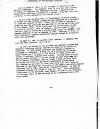
|
5.
November 14, 1912.
Admiral W. H. B. Southerland, off Corinto, to
the Secretary of the Navy, Washington, p. 5.
" . . . ¶ Born on
March 5, 1880, in the village of Concordia in
New Segovia, Nicaragua. His parents, both of
whom are still living at Esteli, in Segovia, are
Mercelino Zeledon, a carpenter and Maria Salome
Rodriguez, a daughter of a farmer. They had five
other children, of whom Benjamin is the second
eldest. ¶ In his youth Benjamin went to
Tegucigalpa, Honduras, where he worked his way
through college and was graduated as a Batchelor
[Bachelor] of Signs and Letters in 1900. After
this he went to Managua to study law and was
graduated and admitted to the Bar as an advocate
in the summer, 1903. After practicing law for
two years he was appointed a District Judge in
Managua. Later he went to Cabo Grecies [Cabo
Gracias?], where he served as a mining judge,
until his return to the general practice of law
in Managua in 1906. Previous to this, in 1904,
during the Chamorro revolution against Zelaya he
served as Chief War Accountant. ¶ On June 30,
1905, he married Ester Ramirez, of Managua, who
bore him four children - all living. ¶ In 1907,
he served in the national war against Honduras
and Salvador, receiving special mention for
valor in the battle of Namisigue [Namasigüe?].
In 1908 Zelaya appointed him Charge D’Affairs of
Nicaragua in Guatemala. During the 1909
revolution he served under Madriz and took part
in the battle of Fisma, where the forces of
Emiliano Chamorro were routed. Shortly after
this he was appointed Minister of War and served
as such until the fall of the Madriz Government,
when he sought refuge in Costa Rica. Returning
from there he was almost immediately exiled
again and remained as an exile in Costa Rica
until June 1912, when he returned to Nicaragua
and took part in Luis Mena’s revolution against
President Adolfo Diaz, serving as
Commander-in-Chief. As such he bombarded Managua
but failed to take the city. After sustaining
bombardment on the Barranca, near Masaya, he
fled in the direction of Jinotepe, where he was
captured by an outpose [outpost?] and died a few
hours later."
|
|
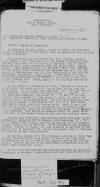
|
1.
November 18, 1912.
"Report of Operations." Lt. Col. Charles
C. Long, León, to Regimental Commander, First
Provisional Regiment, U.S.M.C., p. 1. "Headquarters
¶ United States Forces, ¶ Leon, Nicaragua. ¶
November 18, 1912. ¶ From: Lieutenant Colonel
Charles G. Long, U.S.M.C. ¶ To: Regimental
Commander, First Provisional Regiment, U.S.M.C.
¶ Subject: Report of Operations. ¶ In obedience
to your orders, I have to submit the following
report of operations of the troops under my
command in the vinicity of Leon, Nicaragua. ¶
The operations may be divided into four periods,
namely: First Period -- from the arrival of the
troops on September 5th, including the taking of
the trains on September 9th, to about September
12th, when a permanent camp was established.
Second Period -- from September 12th, to
September 25th, this includes the time during
which neutrality was observed and ends with the
receipt of instructions from the Navy Department
to support the established Government. Third
Period -- from receipt of the orders above
mentioned to and including the taking of the
city of Leon, October 6th, Fourth Period -- the
military occupation of the city of Leon. ¶ On
the morning of September 6, 1912, I arrived by
train at a point about 300 yards south of the
railroad bridge over the Rio Chiquito. On this
train were Companies “A” - “B” and “D” of this
regiment, under command of Major William N.
McKelvy. At that place were encamped, Companies
“E” - “F” and “G” of this regiment under command
of Major George C. Reid, and here I reported to
you at your headquarters. At this time there was
also stationed a company of bluejackets from the
U.S.S. California, under Ensign Train, acting as
bridge guard. About 10 a.m. the same date a
battalion of four companies, one of marines,
from the U.S.S. Colorado, under the command of
Lieutenant H.G.S. Wallace, U.S.N., arrived. This
battalion encamped about 350 yards south of the
camp of the Second Battalion and near the
railroad track. ¶ Yourself and Regimental
Headquarters having proceeded on the afternoon
of September 6th to Managua, with Companies “A”
- “B” and “D” under Major McKelvy, the
undersigned was left in command of naval forces
in this vicinity. First Lieutenant and Battalion
Adjutant, William C. Powers, Jr., was detailed
as Adjutant of the command, and on September
9th, Second Lieutenant Lloyd W. Williams was
detailed as Camp Quartermaster. ¶ On the 7th,
Company “C”, this regiment, arrived by train
from Corinto, train bringing large supply of
stores and three guns. I was authorized by you
to retain this company temporarily with my
command. Another company of the California
bluejackets also arrived, under Lieutenant
Horner. At this time the railroad was operated
entirely by crews of bluejackets or marines.
Instructions had been received from the . . . "
|
|
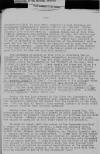
|
2.
November 18, 1912.
"Report of Operations." Lt. Col. Charles
C. Long, León, to Regimental Commander, First
Provisional Regiment, U.S.M.C., p. 2. "
. . . Commander-in-Chief to make every
endeavor to open railroad and telegraphic
communication between Corinto and Managua.
Effort was made to get the local authorities to
put men to work on the telegraph line without
results. Liberal forces had at this time in
their possession the railroad station in Leon,
two engines and a number of cars, of all kinds,
including two flat cars armored with sand bags,
and a construction car. Orders were received on
the 7th of September to obtain possession of the
aforesaid rolling stock for the use of our
troops as required and to turn over to the
railroad company. Plans were accordingly made on
the evening of this date for the movement of the
troops under my command to enter the city of
Leon and take this material. ¶ The political
situation at this time in substance was as
follows: The revolutionary forces, consisting
principally of the “Artesanos” of the city of
Leon and small farmers of the neighboring
territory, their ranks swelled by the riffraff
of the city, were in armed possession thereof.
These people had risen and taken the city on the
17th and 18th of August, killing the majority of
the Federal Garrison, and giving over to
unbridled loot, the houses and stores of all
those particularly affiliated with the
Conservative Government. The city, and to a
large extent the departments of Leon and
Chinandega, were administered by an official who
was called the Executive Delegate of those
Departments. This man was Dr. Leonardo Arguello
of Leon. The remainder of the officers whose
functions were not totally inoperative were
filled by other prominent Liberals, installed as
a result of this successful uprising. The men
under arms were under the nominal command of
General J. M. Rivas who bore the title of
General-in-Chief. A number of other “Generals”
served under him. ¶ During the two days covered
by the first few paragraphs the undersigned had
several interviews with General Rivas, who is
much more reasonable, sensible and honest than
the majority of the leaders. With the help of
General Rivas several matters of which might
have caused friction were amicably arranged. ¶
During these few days and those immediately
succeeding, the undersigned was called upon by a
number of other leaders, who evidently desired
to acquaint themselves with our attitude and
acquaint us with theirs. Several American and
foreign residents in Leon also called to
acquaint me with their views of the situation. ¶
In order to comply with the orders of the
Commander-in-Chief in regard to the railroad
property, I sent for Generals Rivas, Barreto,
Dr. Arguello and Mr. Sampson. At 9:30 a.m. on
the 8th, General Rivas, General Santiago
Arguello, Dr. Toribio Arguello and Mr. Sampson
arrived at my headquarters. I first took up the
matter of telegraph communications and was
informed by General Rivas that orders had been
given to his troops not to interfere with
telegraph lines or repair parties. I then
informed the visitors of my orders with respect
to the railroad rolling stock and they replied
that they were not authorized to conduct
negotiations on the question; but that the
Executive Delegate, who had failed to come with
them, would be pleased to see me at any
convenient hour. . . . "
|
|
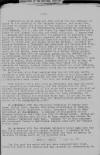
|
3.
November 18, 1912.
"Report of Operations." Lt. Col. Charles
C. Long, León, to Regimental Commander, First
Provisional Regiment, U.S.M.C., p. 3. "
. . . I decided to go at once and gave orders
for the movement of troops to the vicinity of
the railroad station, and other dispositions to
effect the taking of the rolling stock by force
if necessary. I went to the Commandancia
accompanied by Lieutenant H.G.S. Wallace,
U.S.N., and met there the Executive Delegate and
a number of the Liberal military and civil
officials. I acquainted the Delegate and
associates with the necessity of delivering the
trains and after considerable argument and many
protests they agreed to remove their soldiers
from the vicinity of the railroad station in
order that the trains might be removed. In order
to create a diversion a “triunfo” was published
and rockets and firecrackers were shot off and
bells rung in the center of the city. Meanwhile
the troops in the vicinity of the railroad
station, mostly on the trains, were subjected to
a rather trying ordeal, being face to face with
an hostile, armed mob for several hours. The
withdrawal of the rolling stock to our camp was,
however, fortunately effected without shooting.
Since this movement I have had at my orders,
with several interruptions of a day or two, an
engine and several cars, and have used this
train for special movements of troops, special
trains for myself and other officers, for guards
in repairing telegraph lines and to procure wood
and to move supplies. ¶ As the camp site then
occupied was too wet for any lengthy occupation
a good camp site was located about a half mile
east of the other, and on September11th
[September 11th] and 12th the Second Battalion
and my headquarters were moved. This camp was
called Camp Pendleton. ¶ When looking for a camp
site an excellent one near the water works
reservoir was considered, but the proposition
met with vehement opposition on part of the
water works manager who claimed there was not
sufficient water to supply the troops.
Additional trouble was experienced with this
man, Mr. Jose Montalvan, in the matter of
keeping the railroad water tank filled and he
was found to be an accomplished liar and
obstructionist although belonging to the
conservative party. ¶ On September 10th the
following movements of troops took place: Ensign
Train Company California bluejackets to Managua,
Colorado’s Marine Detachment, under Lieutenant
Willis to Camp Southerland at Queselguaqua
[Quezalguaque?]. A company of bluejackets of the
Colorado Battalion took over the duty of Bridge
guard. Stores arriving from Corinto were shifted
at Leon station and stores for this command
deposited near camp. Company “C” of this
regiment and Lieutenant Horner’s California
Company also left for Managua on this date. ¶ On
September 12th the Colorado Battalion moved camp
into the same field occupied by the Second
Battalion. A company of the Colorado Battalion
under Lieutenant Scott was sent to occupy La Paz
about 12 miles south on the railroad line. ¶
SECOND PERIOD. ¶ For the next two weeks matters
were comparatively quiet. During the period the
undersigned was governed by instructions to . .
. "
|
|
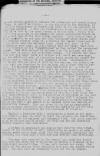
|
4.
November 18, 1912.
"Report of Operations." Lt. Col. Charles
C. Long, León, to Regimental Commander, First
Provisional Regiment, U.S.M.C., p. 4. "
. . . observe strict neutrality between the
government and revolutionary forces, to permit
no fighting in the vicinity of the railroad, to
permit no bombardment of unfortified towns or
any act contrary to civilized warfare. I also
had instructions to not allow the railroad to be
used by the armed forces of either side. During
this period the attitude of the rebels was
always suspicious toward us and a good deal of
the time rather hostile. Their pickets were in
close proximity to our camp and they maintained
armed guards near the railroad station (they had
a machine gun paced there), and at other points
near the railroad line. Those with whom we had
intercourse were frank in their belief that our
forces were here in the interest of the
“Chamorristas” as they called the government
forces. They also refused to believe that the
railroad was not being used to assist the
government forces. The command was occupied with
the heavy guard and outpost duty which was
necessary, and the additional work of furnishing
train guards and guards for repair parties
working on the telegraph lines. Considerable of
the latter work was done at first by our own
men, but later a repair party was furnished by
the railroad and a guard from my command. The
railroad started to move passengers on the 13th
of September; but the trains were still run
under the charge of our forces with native train
crews. Some difficulty was experienced with
these train crews, and the same with telegraph
operators and linemen who were much afraid of
the Leonese. First Lieutenant H.W. Stone was
detailed on railroad duty during this period;
his duties consisted in supervising the railroad
guards and train crews assisting the railroad
officials and generally of pushing along all the
railroad service. Our first fresh beef received
since landing was received on September 13th
from the Glacier, also the first ice was
received from Chichigalpa on this date.
Considerable difficulty was experienced in
obtaining bull carts for camp transportation
owing to the attitude of suspicion on the part
of the people in the vicinity. On September 14th
I informed the Executive Delegate by letter of
my instructions as above stated, and on the 15th
I was called on by General Rivas who desired an
elucidation thereof. This was given him as far
as practicable and he appeared satisfied and
pleased and agreed to use his best efforts
toward cooperation and the avoidance of
friction. ¶ Beginning September 15th I
established a guard at the railroad station,
Leon, in order to guard the property and
facilitate the opening of the railroad and
telegraph line. The guard consisted of an
officer and an average of forty men and was
installed without creating much excitement. ¶ A
number of complaints and claims were received
from inhabitants of the vicinity of camp,
principally on account of wood of various sorts
having been taken from the adjacent properties
for firewood, but these claims were adjusted
without much difficulty. ¶ The camp site
occupied by the command was excellent except
that wood and water had to be hauled or carried
a distance of approximately one-half mile. It
was well drained and sunny. The health of the
command while occupying this camp was
exceptionally good. The rain fall was unusually
light for the wet season. . . . "
|
|
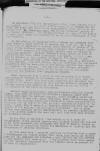
|
5.
November 18, 1912.
"Report of Operations." Lt. Col. Charles
C. Long, León, to Regimental Commander, First
Provisional Regiment, U.S.M.C., p. 5. "
. . . ¶ On September 17th the
Commander-in-Chief, Rear Admiral W.H.H.
Southerland, U.S.N., and staff arrived enroute
to Managua and remained for about two hours at
my headquarters where he had an interview with
Dr. Francisco Baca, one of the principal leaders
of the Liberal movement. The Admiral informed
Dr. Baca of his desire to bring about peace and
advised him as to the uselessness of further
fighting. ¶ On the evening of September 15th a
report was received that Major Butler’s train
enroute to Granada was fired on. At 6 a.m. on
the 18th of September a special train arrived in
charge of Mr. Powers of the railroad company
with a message from Colonel Pendleton to myself
ordering the artillery company sent to Managua
as quickly as possible. Captain Underwood being
absent on duty in Corinto at the time, First
Lieutenant W.C. Powers, U.S.M.C., was sent in
command of that portion of Company “E” (about 70
men) then in camp, with the two 3-inch field
guns, Mark VII, belonging to that company. The
next morning Captain Underwood and Lieutenant
Messersmith and the remainder of the company
arrived from Corinto and proceeded to Managua.
This company and officers returned about 10 p.m.
September 20th, having taken part in the forced
opening of the railroad from Managua to Granada.
¶ About September 20th I began to send
detachments on short reconnaissance marches in
the country south of the city, near the railroad
line. About this date also telephone and
telegraph communication to Managua became of
some service although subject to frequent
breaks; and occasional wire communication was
had to the stations as far north as Chinandega.
¶ Several small difficulties were experienced
with the Liberal forces, viz; they continued to
maintain a menacing guard with machine guns near
the railroad station, their sentries continued
to fire their rifles with great frequency, small
obstructions were placed on the railroad track
and considerable delay experienced in complying
with my orders to fill up their trenches
adjacent to the track. I also was in receipt of
frequent complaints that the neutrality of the
railroad was not being maintained. All of these
matters were arranged rather satisfactorily by
several conferences with the Liberal leaders who
were told that they must take sincere and
energetic action. ¶ On the 24th of September I
was called on by a party of twenty-three of the
Liberal leaders and Military Chiefs who desired
to pay their respects, and expressed the best of
feeling toward us and the best of intentions
toward the avoidance of friction and the
continuance of friendly relations. ¶ On this
same date I received positive information that a
party of adventurers and former exiles from
Costa Rica headed by General Irias and Dr.
Espinoza had effected a safe landing and had
arrived in Leon several days previously. I was
informed that these people were not favorably
impressed with the Liberal cause on account of
its lack of organization. . . . " [page 6
of this report is missing]
|
|
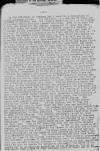
|
7.
November 18, 1912.
"Report of Operations." Lt. Col. Charles
C. Long, León, to Regimental Commander, First
Provisional Regiment, U.S.M.C., p. 7 (p. 6
missing). "
. . . ¶ On the afternoon of October 3rd I
received a delegation of foreign citizens of
Leon. The following is a summary of their
expressions of opinion, etc. The present
condition will go on forever if American troops
continue present attitude. Even if we stop the
fighting and establish the present government in
power the same thing will break out again after
our troops leave the country. It is doubted if
the government troops could take Leon, and even
if they took it there is a question as to their
ability to hold it. If we say to the leaders
that they must lay down their arms before we
will treat with them it is very likely that they
will see no recourse for themselves but a
continuation of their present contest. Many of
the men of the rebel forces desire to fight and
enjoy fighting. They have no idea of the value
of life, even their own lives. The leaders have
an unruly mob to deal with and whatever is done
must be done quickly and without giving the mob
time to discuss and consider the terms, thereby
bringing up points of argument, twisting the
terms into unfavorable lights tending to further
complications. It is believed that the present
is a most opportune time to strike a blow on
account of the defeats which the rebels have
suffered. The necessity for this blow is, of
course, not apparent from a military point of
view but is desirable on account of the
condition on [of?] anarchy which exists the
prolongation of which will bring on famine and
the total ruin of the peasant class. It is
throught [thought] the rebels would accept an
arrangement by which they would have a voice in
the government up to the time that an election
may be held. Of course the leaders will expect a
guarantee of their lives and property, otherwise
they would have to flee, becoming factors
dangerous to the future peace of the country.
Suggestion made that an armistice be arranged
and believed that such could be arranged and
made effective in twenty four hours. Such an
armistice being preliminary to the conference
between the government and the Liberal leaders,
a conference for the purpose of effecting an
agreement for the resumption of peaceful
relations and the promise of a free election.
The foreigners believe that the fighting would
be stopped at once if the United States Forces
would guarantee a free election at any time
within from three months to three years; the
government meanwhile to be under the control of
the United States. The people with peaceful
interests would welcome a military government by
the United States. If the leaders have to flee
the Americans will have to fight theyr [their]
way into Leon and maintain a large garrison
indefinitely. The Leonese are now loading
ammunition and manufacturing bombs. The civil
administration at Leon, that is the
municipality, is very efficient. The Liberals
constitute three-fourths of the country. The
present government is not in power by the will
of the people, the elections of the house of
Congress were most fraudulent. President Diaz is
not thought to be a very strong man. It was the
people known as the “artesanos” who rose and
took Leon. They do not leave the town and are
quite capable of repeating such uprisings
frequently. As far as the question of robbery
and looting is concerned the forces on one side
are no better than those of the other. The small
towns are looted and pillaged alternately by the
bands of both parties and the people are in a
desperate condition. The foreigners believe that
some terms could be given to the Liberal leaders
and a free election guaranteed the continued
presence of American troops would be unnecessary
and that one of more American officers in the
capital of each department would be able to
handle the situation admirably. The above is
inserted not as an accurate exposition of the
situation, but as an expression from a more or
less unbiased point of view, and it throws . . .
"
|
|
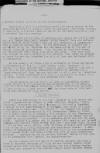
|
8.
November 18, 1912.
"Report of Operations." Lt. Col. Charles
C. Long, León, to Regimental Commander, First
Provisional Regiment, U.S.M.C., p. 8.
" . . . a
certain amount of light on the circumstances. ¶
Considering that the situation should be
communicated to the Commander-in-Chief in detail
I sent my Adjutant, Lieutenant Powers, to
Managua by a special train to report to
Commander-in-Chief, and he returned the next
evening. ¶ The report of the fall of Coyotepe
and Masaya and of the fact that our troops took
part therein having reached here and matters
having reached acute stage I stopped all
movements of passengers through Leon on October
4th. On the afternoon of October 5th I was
called on by Dr. Espinoza who was accompanied by
the son of General Irias as interpreter. They
desired to know what terms the “emigrados” from
Costa Rica would be given. They were told that
subject to the approval of the Admiral, they
would be allowed to leave the country provided
the city of Leon was delivered without
resistance. ¶ On the evening of October 5th a
battalion of three companies of bluejackets of
the U.S.S. California, under Lieutenant G. W.
Steele, U.S. Navy, arrived from Managua, also a
section with two 3 inch guns to join Captain
Underwood’s artillery company and a “Peace
commission” from Managua included in which was
Dr. Sebastian Salinas. It was understood that
they had authority to treat with the rebel
leaders and they were escorted into Leon. ¶ For
an account of the taking of Leon and attending
circumstances attention is invited to the
attached copy of my report, up to this time the
Second Battalion, First Provisional Regiment,
had been under my direct command and the
operations of this battalion are covered by this
report. ¶ FOURTH PERIOD. ¶ After the occupation
of the city detailed in the report mentioned I
appointed ad interim a Jefe Politico, Alcalde,
Public Treasurer, Postmaster and Chief Surgeon
of the public hospital to assist in the
administration of affairs, and other officials
as developments required. The Chiefs of the
tobacco and aguardiente depots were appointed by
the Government. Under my direction a large
quantity of tobacco, the property of the
Government, and which had been misappropriated,
was secured by search and delivered to proper
custody. The aguardiente depot has not yet been
opened. Captain F.A. Ramsey was on October 12th
detailed as Provost Marshall and Provost Judge
of the city and I assigned Major Charles S. Hill
to duty on my staff. Both of these officers have
performed their duties in a highly efficient and
creditable manner. A censorship of newspapers
was instituted resulting in the suppression of
two papers which published little but more or
less incendiary articles. I enclose copies of
certain “Avisos” issued to the public in
connection with Martial Law Administration. ¶ On
the morning and the day this command entered the
city a force of reported strength of fifty to
one hundred rebels under General Osorio left the
city supposedly for the Honduran border. This
band was pursued by the Federal troops under
General Carmen . . . "
|
|
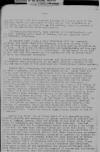
|
9.
November 18, 1912.
"Report of Operations." Lt. Col. Charles
C. Long, León, to Regimental Commander, First
Provisional Regiment, U.S.M.C., p. 9. "
. . . Diaz who had by this date secured control
of a large part of the territory north and
northeast of this city. The detachments of this
force, living as they did on the country, were
the source of many of the complaints above
referred to. ¶ The Commander-in-Chief, Rear
Admiral W.H.H. Southerland, and his staff
arrived about noon of October 8th and remained
until the following afternoon. ¶ On October 10th
I had a long interview with Dr. Leonardo
Arguello, the Rebel Executive Delegate, who gave
me what I believe to have been a frank account
of his acts and the situation at the time. He is
a man of some ability and considerable culture
and I do not believe him to be an incendiary. He
delivered to me what he said were all the papers
in his possession but no information of value
was obtained therefrom. ¶ Telephone
communications between all district commanders
and headquarters were established at an early
date by a detail of our men, use being made of
the abandoned and disorganized public system. ¶
Horses being necessary for communication and
patrolling, a number were impressed, and a few
were loaned to us. Later over 100 horses, most
of which had been stolen from the farms
throughout the country, were turned over to my
command by the Federal troops under General
Viquez, at La Ceiba. Many of these horses were
in bad condition. Having received instructions
from you to obtain horses and equipment for a
mounted expedition to Matagalpa, I requisitioned
additional horses and equipment through the
medium of the Jefe Politico. Some horses were
also obtained from the forces of General Enrique
Chamorro which arrived at La Ceiba about October
17, 1912. The originally intended strength of
the Matagalpa expedition having been reduced on
account of bad roads I sent three officers and
sixteen enlisted men, Navy and Marine Corps,
with sixteen additional horses, to La Paz Viejo
on October 16, 1912, to join your expedition.
These officers and men returned November 1st.
The return of horses has been a considerable
problem, the question of ownership being in many
cases doubtful and I have therefore turned them
over from time to time to the Jefe Politico for
distribution. There now remain thirty-three
horses in use by my command. ¶ During the first
two or three weeks of our occupation very
numerous reports and complaints of abuses
committed by robbers and bands of Federal
troops, from the suburbs of the city to the
provinces of Matagalpa and Nueva Segovia, were
received. Mounted patrols were sent out to
investigate conditions within a few miles of the
city to warn back Federal troops and quiet the
people. The people were fearful that the Federal
troops would be permitted to occupy the city and
repeated rumors that these troops were
approaching caused alarm and undoubtedly
operated to prevent the turning in of any arms.
Up to the present there has been captured or
turned in, two field pieces, four machine guns,
about twenty dynamite bombs, several boxes of
dynamite with caps and fuses, about three
hundred rifles and a number of fighting machetes
and revolvers. After about a week of our
occupation had passed sufficient confidence
obtained in the city for the opening of stores
and the bringing in of provisions from the
surrounding country. . . . "
|
|
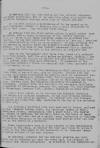
|
10.
November 18, 1912.
"Report of Operations." Lt. Col. Charles
C. Long, León, to Regimental Commander, First
Provisional Regiment, U.S.M.C., p. 10. "
. . . On October 12th the Post Office and the
National Telegraph commenced operations, but it
was some time after this before any effective
telegraph service other than to Managua existed.
¶ On the 17th instant a disturbance at La Paz
caused me to send Lieutenant Charles G. Sinclair
with a small detachment to pacify that place.
They remained three days. ¶ On October 19th the
first native police (a small number) were
appointed, acting under supervision of the
Provost Marshall. A Chief of Police named Isaac
Gutierrez Navas was appointed from Managua. He
was very obnoxious to the public of Leon and I
received many recommendations that he be
superseded. He soon effected his own removal by
getting drunk and creating a disturbance on the
streets. On this date it was publicly announced
that a Presidential election would be held in
the Republic on November 3rd. ¶ Most of the
“emigrados” from Costa Rica, previously referred
to in this report, left the city before we
entered, fearing, I was informed, that the
failure to deliver the city without resistance
would prevent their free exit afterward. By
agreement of the Nicaraguan Government those who
remained were given passports out of the country
by me. ¶ Under instructions of the
Commander-in-Chief reductions in the force under
my command were made as follows: October 12th
one company California bluejackets to Managua,
also gun detachment company “A” 3rd Battalion;
October 20th, the bluejacket company returned.
October 20th, California Marines to Chichigalpa
and Posoltega. October 21st, two companies
California bluejackets to Chinandega. October
22nd, the remaining two companies California
bluejackets to Chinandega; November 8th, company
“C”, this regiment to Chinandega; November 10th,
Colorado Battalion to their ship. ¶ During this
period, up to the time of the Colorado Battalion
left taking the wireless operators, we had good
wireless communication with the ships at
Corinto. On November 1st, the wireless apparatus
was moved from Camp Pendleton to the top of the
cathedral in this city. ¶ The following
buildings have been occupied by troops; railroad
station (vacated October 23rd), the Cathedral
(rooms in rear), Guadaloupe Church, Commandancia
(for a short time), The Cuartel and church of
Subtiava, the building known as the house of
Ramon Chica which had been used as a school
house, University of Medicine, the building
belonging to the railroad near station which had
been used by the rebels as a barracks. ¶ These
headquarters were at first located in the
Commandancia building in the Plaza, on October
8th they were moved to Lupone’s hotel, on the
12th again to the residence of Mr. Narcisso
Lacayo he having offered it for that purpose. ¶
On Saturday, November 2nd the National election
was held, there was no disorder and very few
votes cast, the Liberals refraining from voting
altogether. By direction of the Commander-in- .
. . "
|
|
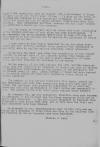
|
11.
November 18, 1912.
"Report of Operations." Lt. Col. Charles
C. Long, León, to Regimental Commander, First
Provisional Regiment, U.S.M.C., p. 11. "
. . . Chief I had previously sent on October
30th a detachment of three officers and 50 men
under Major William N. McKelvy to the towns of
Jinotepe and Diriamba in the Department of
Masaya, to be present during the elections and
to obtain certain information about that
district. This detachment returned November 4th
and Major McKelvy has submitted a report on this
movement. ¶ The Red Cross or Military Hospital
which took care principally of the wounded
soldiers of both sides has been discontinued. It
was necessary for me to concern myself more or
less with the administration of the Hospital and
to require the allotment of public funds for its
support. ¶ I have required the Public Treasurer
to pay for extra stationary and for printing
incident to my assuming the Government of this
city, also to pay for rations furnished public
prisoners. ¶ An attempt has been made under the
supervision of the Provost Marshall to collect
some of the property looted from houses and
stores in the city. Some, but only a small
percentage of these goods, has been obtained and
restored to its owners. ¶ On the evening of the
16th instant the Jefe Politico received orders
from the President of Nicaragua to arrest and
sent [send] to Corinto for deportation
twenty-seven of the leaders of the revolution
and the Liberal party in Leon. About fifteen of
these men were secured by the native police and
were sent guarded by these police to Corinto
yesterday. ¶ The conduct of the command
throughout this trying period has been
excellent, and with less exceptions than might
have been expected, the personnel have conducted
themselves in an exemplary manner and will full
appreciation of their duties and
responsibilities. The people of the city have
highly praised their conduct. ¶ On November 7th,
by your authority, transfers were made between
the companies of the regiment and the three
companies which are to remain here organized. A
few additional transfers to complete this
organization have since been made, and on this
date the Field and Staff transfers have been
ordered. ¶ As directed by you, reconnaissance
maps of this city and environs for a distance of
three miles and also of the railroad line and
vicinity as far as Nagarote have been completed.
¶ Charles G. Long."
|
|
1916
|
|
|
|
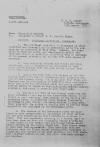
|
August 28, 1916.
"Political conditions, Nicaragua."
Commanding Officer O. G. Murfin,
U.S.S. Albany off
Corinto, to Admiral William B. Capterton,
Commander in Chief, U.S. Pacific Fleet, p. 1.
"Confidential.
¶ 1-169--OGM-AAN ¶ U. S. S. ALBANY ¶ Corinto,
Nicaragua, ¶ 28 August, 1916. ¶ From: Commanding
Officer. ¶ To: Commander in Chief, U. S. Pacific
Fleet. ¶ SUBJECT: Political conditions,
Nicaragua. ¶ 1. The political condition in
Nicaragua is still unsettled and uncertain and
no prediction as to the outcome can be attempted
at this time. However, the situation is becoming
acute, and developments within the next week
should so establish conditions that an estimate
of the general situation can be made with some
degree of accuracy. ¶ 2. Many political reports
and rumors are being circulated, but no
dependence can be placed in them. Their nature
changes with the part of the country from which
they originate. ¶ 3. During the last week, the
leaders of the Government party have been in
conference with prominent members of the Liberal
party. It is supposed that these conferences are
for the purpose of effecting some combination
which will give the Government party the coming
election without having to resort to the
high-handed methods usually adopted by the party
in power to gain their ends. ¶ 4. The rank and
file of the Liberal party are not being molested
in any way by the Government; while, it is
stated on good authority, that members of the
Genuine Conservative party, in districts where
General Chamorro’s following is very strong, are
being coerced in many arbitrary ways with the
object of forcing them to promise their support
to the candidate of the Government party. ¶ 5.
The leaders of the Government party are daily
becoming more antagonistic to candidates of
other parties and are more determined in their
efforts to continue in power. They are
apparently counting on a report, said to have
been received from the Nicaraguan Charge
d’Affaires in Washington to the effect that the
United States would remain neutral in the coming
elections. This report seems to have made them
aggressive. They have also made the statement
that the United States Government’s candidate in
Panama was not elected in the last election, and
this statement, whether correct or not, has
given them much courage and elation. . . . "
|
|
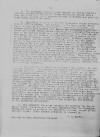
|
August 28, 1916.
"Political conditions, Nicaragua."
Commanding Officer O. G. Murfin,
U.S.S. Albany off
Corinto, to Admiral William B. Capterton,
Commander in Chief, U.S. Pacific Fleet, p. 2.
"
. . . ¶ 6. The situation would be much cleared
and serious trouble probably avoided if the
United States Government should take a firm
stand for some one of the presidential
candidates and give him their moral support at
least. ¶ 7. Recruiting is going on and the
Government forces strengthened at various
points. The garrison in the Campe Marte, where
the U. S. Marines forming the Legation Guard are
quartered, now numbers nearly four hundred men.
Should the Government’s attitude toward the
United States become unfriendly or aggressive
the situation of the marines would be a most
undesirable one. Even as matters stand now, any
hostile, or apparently hostile action on the
part of the Nicaraguan forces in Campe Marte,
whether intentional or accidental, and
particularly at night, would call for prompt
action on the part of the marines without
waiting to investigate the reasons for such act.
The American Legation is about five blocks from
Campe Marte, and any hostile act against the
Legation would mean that, to go the Minister’s
defense, the guard must either be split up, a
most dangerous proceeding, or else leave
unguarded their stores and supplies also a
dangerous proceeding, since the supplies must
include the reserve ammunition. This condition
which has been made the subject of previous
correspondence by officers in command at this
station, becomes particularly important at this
time owing to the conditions that might possibly
develope [develop] from the political situation.
¶ 8. The American Minister has selected a new
location for the American Legation. The property
is large enough both for Legation purposes and
for quartering the full legation guard, and it
has other characteristics which make it a most
suitable and desirable place for the purpose.
The Minister has received word from the State
Department, however, that there is little
probability of the present Congress
appropriating the money necessary for the
purchase of the property. The owner of the
property has given authority for the Minister to
occupy it at any time he considers it necessary
or desirable. Advantage will probably not be
taken of this offer until such time as
conditions approach a crisis, at which time any
attempt to move the marines from their present
location with their arms, ammunition, equipment
stores, and other supplies would be accompanied
with much danger; and, unless considerable
equipment and supplies should be abandoned,
would probably be impossible. All this, of
course, dependent upon the nature of the crisis
and the attitude of the Nicaraguan Government.
9. The necessity for a new location for quarters
for the Legation Guard, one which will be well
separated from the Nicaraguan forces and which
is suitable for defensive purposes, cannot be
too strongly urged. Their present situation is
impossible. ¶ O. G. Murfin. ¶ One copy to Navy
Department (direct)6. The situation would be
much cleared and serious trouble probably
avoided if the United States Government should
take a firm stand for some one of the
presidential candidates and give him their moral
support at least. ¶ 7. Recruiting is going on
and the Government forces strengthened at
various points. The garrison in the Campe Marte,
where the U. S. Marines forming the Legation
Guard are quartered, now numbers nearly four
hundred men. Should the Government’s attitude
toward the United States become unfriendly or
aggressive the situation of the marines would be
a most undesirable one. Even as matters stand
now, any hostile, or apparently hostile action
on the part of the Nicaraguan forces in Campe
Marte, whether intentional or accidental, and
particularly at night, would call for prompt
action on the part of the marines without
waiting to investigate the reasons for such act.
The American Legation is about five blocks from
Campe Marte, and any hostile act against the
Legation would mean that, to go the Minister’s
defense, the guard must either be split up, a
most dangerous proceeding, or else leave
unguarded their stores and supplies also a
dangerous proceeding, since the supplies must
include the reserve ammunition. This condition
which has been made the subject of previous
correspondence by officers in command at this
station, becomes particularly important at this
time owing to the conditions that might possibly
develope [develop] from the political situation.
¶ 8. The American Minister has selected a new
location for the American Legation. The property
is large enough both for Legation purposes and
for quartering the full legation guard, and it
has other characteristics which make it a most
suitable and desirable place for the purpose.
The Minister has received word from the State
Department, however, that there is little
probability of the present Congress
appropriating the money necessary for the
purchase of the property. The owner of the
property has given authority for the Minister to
occupy it at any time he considers it necessary
or desirable. Advantage will probably not be
taken of this offer until such time as
conditions approach a crisis, at which time any
attempt to move the marines from their present
location with their arms, ammunition, equipment
stores, and other supplies would be accompanied
with much danger; and, unless considerable
equipment and supplies should be abandoned,
would probably be impossible. All this, of
course, dependent upon the nature of the crisis
and the attitude of the Nicaraguan Government.
9. The necessity for a new location for quarters
for the Legation Guard, one which will be well
separated from the Nicaraguan forces and which
is suitable for defensive purposes, cannot be
too strongly urged. Their present situation is
impossible. ¶ O. G. Murfin. ¶ One copy to Navy
Department (direct) 6. The situation would be
much cleared and serious trouble probably
avoided if the United States Government should
take a firm stand for some one of the
presidential candidates and give him their moral
support at least. ¶ 7. Recruiting is going on
and the Government forces strengthened at
various points. The garrison in the Campe Marte,
where the U. S. Marines forming the Legation
Guard are quartered, now numbers nearly four
hundred men. Should the Government’s attitude
toward the United States become unfriendly or
aggressive the situation of the marines would be
a most undesirable one. Even as matters stand
now, any hostile, or apparently hostile action
on the part of the Nicaraguan forces in Campe
Marte, whether intentional or accidental, and
particularly at night, would call for prompt
action on the part of the marines without
waiting to investigate the reasons for such act.
The American Legation is about five blocks from
Campe Marte, and any hostile act against the
Legation would mean that, to go the Minister’s
defense, the guard must either be split up, a
most dangerous proceeding, or else leave
unguarded their stores and supplies also a
dangerous proceeding, since the supplies must
include the reserve ammunition. This condition
which has been made the subject of previous
correspondence by officers in command at this
station, becomes particularly important at this
time owing to the conditions that might possibly
develope [develop] from the political situation.
¶ 8. The American Minister has selected a new
location for the American Legation. The property
is large enough both for Legation purposes and
for quartering the full legation guard, and it
has other characteristics which make it a most
suitable and desirable place for the purpose.
The Minister has received word from the State
Department, however, that there is little
probability of the present Congress
appropriating the money necessary for the
purchase of the property. The owner of the
property has given authority for the Minister to
occupy it at any time he considers it necessary
or desirable. Advantage will probably not be
taken of this offer until such time as
conditions approach a crisis, at which time any
attempt to move the marines from their present
location with their arms, ammunition, equipment
stores, and other supplies would be accompanied
with much danger; and, unless considerable
equipment and supplies should be abandoned,
would probably be impossible. All this, of
course, dependent upon the nature of the crisis
and the attitude of the Nicaraguan Government.
9. The necessity for a new location for quarters
for the Legation Guard, one which will be well
separated from the Nicaraguan forces and which
is suitable for defensive purposes, cannot be
too strongly urged. Their present situation is
impossible. ¶ O. G. Murfin. ¶ One copy to Navy
Department (direct)"
|
|
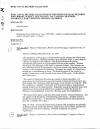
|
September 16, 1916.
"Review of Political Situation," in "Report of
Operations, West Coast of Nicaragua."
Capterton to Secretary of the Navy, p. 1.
[Notes taken from
original documents] "RG45:
NAVAL RECORDS COLLECTION ¶ RG45: NAVAL RECORDS
COLLECTION OF THE OFFICE OF NAVAL RECORDS AND
LIBRARY, SUBJECT FILE 1911-1927: WA-7 ALLIED
COUNTRIES, NICARAGUA, DAILY REPORTS AND MISC.
MATERIAL ¶ BOX NO. 751: ¶ nada de interes. ¶ BOX
NO. 752: ¶ Despatches from USS Denver, Aug.
1925-1929 - could be combed through for items of
interest (though I didn’t - no time). ¶ BOX NO.
753: ¶ Folder No. 6: ¶ Sept. 24, 1916: “Report
of Operations, West Coast of Nicaragua,”
Caperton to Sec. of Navy: ¶ “Review of Political
Situation, Sept. 16, 1916: ¶ “The population of
Nicaragua is divided about equally between the
Liberal and Conservative parties. Although
opinions upon this point differ, it seems that
the Liberals are slightly in the majority. The
division between the parties corresponds quite
closely to a geographical division of the
country. Western Nicaragua, from Managua to the
coast, is intensely Liberal. This includes the
most populous district of the Republic, and
Leon, which is the largest city in the country,
is the stronghold of Liberalism. Managua, the
capital, is a Liberal city, though not so
predominantly as Leon. The Eastern portion of
the country is entirely Conservative, with
Granada as the center of this party. All the
Indians are Conservative. ¶ “The extent to which
party divisions are carried is almost
incredible. For generations, the feud between
Leon and Granada, Liberal and Conservative, has
been waged with a bitterness which permeates
every element of social life. With few
exceptions, a member of one party will have
practically no acquaintances among members of
the opposite party. Especially among the
ignorant mass, their opponents are hated with an
abhorrence compared to which the hatred of a
German for an Englishman, a Turk for a Russian,
pales into insignifiance [insignificance]… ¶
“The Conservative party is split into three main
factions. General Chamorro… has the support of
all the Indians, himself being partly Indian…
Another faction is headed by Cuadra Pasos… A
third faction, calling themselves the
Progressives, have for a candidate Dr. Lopez…” ¶
Sept. 19, 1916: “Fusion all Conservative
elements still incomplete but probable. In
Masaya Sunday small fight between Chamorristas
and Liberals, reported two killed several
wounded in fighting. Probably uninspired, no
general significance…” ¶ Oct. 30, 1916: “Report
of Operations, West Coast of Nicaragua,”
Caperton to Sec. of Navy:
|
|
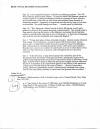
|
September 16, 1916.
"Review of Political Situation," in "Report of
Operations, West Coast of Nicaragua."
Capterton to Secretary of the Navy, p. 2.
" . . . RG45: NAVAL
RECORDS COLLECTION ¶ Sept. 25: voter
registration begins - Liberals are refusing to
register - Five US Naval Officers jeered at
train station: “A crowd of about 200 gathered,
passed in to them copies of a Liberal
proclamation issued as a warning at Leon, jeered
at and insulted them, pelted the car with refuse
and exhibited some firearms in threatening
manner. Apparently an organized mob directed by
three or four men on horseback. No actual damage
was done…” - similar report by Bradshaw… ¶ Sept.
30: “This afternoon a Liberal crowd of about 400
people, mostly girls, gathered in front of the
Legation and made a demonstration. One woman
made a long speech criticizing the actions of
the Minister, and saying that he had been unjust
in controlling the elections in favor of
Chamorro. A great deal of language was used that
was not translatable into respectable English… ”
¶ Oct. 1: “Voting took place all day with polls
crowded. Liberals mostly refrained from voting.
In the afternoon a crowd of about 1500
Conservatives, mostly grown men, a considerable
number from the country but many from Managua,
held a demonstration, trooping through the
streets with Conservative banners… Reports have
come in of a number of small brawls in town in
which three or four men have been killed, but,
in general, order throughout the town has been
excellent… ” ¶ Oct. 2: “In the forenoon, a large
funeral procession, headed by part of the
Nicaraguan band and section of the guard of
honor, passed the Legation with caskets
containing the bodies of the four Conservatives
killed in yesterday’s street fight. In front of
the Campo de Marte the procession stopped and
was addressed by one of its members in an
impassioned speech on the subject of the
patriotism of these men who had died for the
cause of liberty…… Heavy Conservative voting,
Chamorro undoubtedly elected, Liberals mostly
refrained from voting. Four or five men killed
yesterday in street brawls but general order
excellent…” ¶ Folder No. 8: ¶ “Nicaragua”
(Memorandum / draft of booklet of gen. info.),
General Board, Navy Dept. Nov. 26, 1909: ¶ p. 6:
“According to the census of 1890 there were
360,000 inhabitants or a little more than 8 to
the square mile. Of these 16,200 were whites,
198,000 Indians, 1,800 negroes, and 144,000 of
mixed races.”"
|
|
1917
|
|
|
|
|
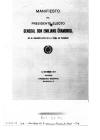
|
1.
January 1, 1917.
"Manifiesto del Presidente Electo Don Emiliano
Chamorro," p. 1.
"MANIFIESTO ¶ DEL ¶
PRESIDENTE ELECTO ¶ GENERAL DON EMILIANO
CHAMORRO, ¶ EN EL SOLEMNE ACTO DE LA TOMA DE
POSESION ¶ 19 DE ENERO 1917 ¶ TIPOGRAFIA
NACIONAL ¶ MANAGUA, NIC."
|
|
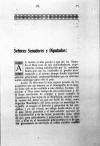
|
2.
January 1, 1917.
"Manifiesto del Presidente Electo Don Emiliano
Chamorro," p. 2.
"Señores Senadores y
Diputados: ¶ AL recibir el alto puesto a que me
ha llamado el libre voto de mis conciudadanos,
experimento íntima satisfacción por la señalada
honra que me ha conferido el pueblo nicaragüense
y al mismo tiempo honda inquietud ante las
gravísimas responsabilidades que en este momento
contraigo para con el país. ¶ Acabo de ofreceros
la más segura prenda de los propósitos que me
animan en el desempeño de la magna tarea que se
ha confiado a mis débiles fuerzas. Al invocar a
Dios como testigo de mis intenciones y de la
firme resolución de cumplir y hacer cumplir la
Constitución y las leyes de la República, me doy
cuenta exacta del deber en que me hallo de
velar, como Supremo Mandatario del país, porque
se mantenga inviolable el respeto al derecho y
garantías de los asociados; y en tal virtud, me
obligo desde ahora a ser el más celoso guardián
y el más estricto ejecutor de la Constitución y
de las leyes, penetrado como estoy de que, para
gobernantes y gobernados, todo es inferior a
ellas en el mecanismo administrativo, y de que
tan gravemente se subvierte el orden público
cuando . . . "
|
|
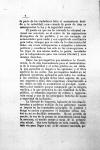
|
3.
January 1, 1917.
"Manifiesto del Presidente Electo Don Emiliano
Chamorro," p. 3.
" . . . de parte de
los ciudadanos falta el acatamiento debido a la
autoridad, como cuando de parte de ésta se
menosprecian la ley y la seguridad común. ¶ El
puesto en que me ha colocado la voluntad
nacional me convierte en el centro de las
aspiraciones divergentes de los partidos, y en
ese concepto, sin animosidades para nadie y con
espíritu de conciliación para todos, siempre que
se trate de la observancia del deber, me veréis
sobreponerme a simpatías e intereses polîticos y
considerar tan sólo en los nicaragüenses a los
hijos de una misma madre, la patria, rescatados
por la independencia para una misma libertad y
unos mismos derechos. ¶ Entre las prerrogativas
que establece la Constitución, la de más
trascendencia para el mantenimiento de la
tranquilidad y el orden público es, sin duda, la
que garantiza el respeto a las opiniones y el
libre ejercicio de los cultos. Esa prerrogativa
tendrá en mi gobierno irrestricta aplicación
para todos los credos; y los católicos del país
deben estar seguros de que, con respecto a
ellos, daré respetuoso cumplimiento a ese deber,
no sólo en acatamiento al precepto constitutivo,
sino también porque comprendo que la religión
católica, a la que pertenece la casi totalidad
de la República, es elemento impulsor de cultura
y regeneración moral y uno de los principales
factores de la paz y seguridad de la Nación. ¶
La libertad de imprenta, baluarte de las otras
libertades y poderoso auxiliar de los gobiernos
cuando se inspira en los inmutables principios
de justicia y dirige su acción a promover el
bienestar social, tendrá en mí un decidido
sostenedor. En mi período de mando, la voz de la
prensa no enmudecerá nunca bajo la amenaza, ni
mucho menas a causa de la persecución oficial.
Sus ecos hallarán en toda ocasión, dilatada vía
para llegar a mí: si de censura razonada, po- .
. . "
|
|
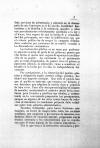
|
4.
January 1, 1917.
"Manifiesto del Presidente Electo Don Emiliano
Chamorro," p. 4.
" . . . drán servirme
de advertencia y estímulo en el desempeño de mis
funciones; y si de acerba hostilidad descendiese
a la diatriba y la calumnia, opondré a ellas mis
procedimientos estrictamente ajustados a la ley
y al honor, bien seguro de que la buena fe y
ecuanimidad del gobernante, así como la
indiferencia con que el criterio público ha de
acoger la campaña difamadora, acabarán por
convencer de su estéril cruzada a los
disociadores sistemáticos. ¶ La instrucción
pública es un ramo que preferente atención
tendrá de parte de mi gobierno, puesto que ella
forma el medio más seguro de apreciar la
civilización de un pueblo. La enseñanza es el
patrimonio que no están dispensados de poseer
ricos ni pobres; y para estos últimos, la
educación viene a constituir el triunfo en la
lucha por la vida, la independencia del
carácter. ¶ Por consiguiente, a la educación del
pueblo, gratuita y obligatoria según nuestro
código político, dedicaré mis mayores energías.
Que todo el pueblo lea; que el pueblo se
instruya; que conozca sus deberes y sus
derechos; que adquiera la noción clara y
práctica de bien vivir. Para ello hay que
multiplicar el número de escuelas, manteniendo
el carácter moral de la enseñanza para levantar
y purificar sus ideales, y aumentando en la
conveniente proporción los presupuestos, aunque
en algunos de los otros ramos hayan de reducirse
al mínimum: la enseñanza primaria debe culminar
sobre todo esfuerzo administrativo. ¶ Tenemos
felizmente, para hacer fructuoso este designio,
un factor de inapreciable valía, las escuelas
normales, que empiezan a proveernos de maestros
verdaderos, llenos de vocación natural,
preparados con la técnica necesaria y los
conocimientos que se requieren para el buen
manejo de los centros educativos. ¶ Por lo que
toca a la instrucción secundaria y pro- . . . "
|
|
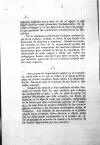
|
5.
January 1, 1917.
"Manifiesto del Presidente Electo Don Emiliano
Chamorro," p. 5.
" . . . fesional,
hallarán una y otra en mí el apoyo a que tienen
derecho como elementos fundamentales de la
cultura humana, y se les dará todo el
desenvolvimiento que permitan las condiciones
económicas de la República. ¶ En la enseñanza
profesional incluyen nuestras leyes la de
carácter normal, es decir, la que tiende a la
formación de maestros y maestras. Siendo las
escuelas normales la clave de la regeneración
escolar del país, puesto que suministran los
maestros idóneos que necesitamos para cambiar la
faz de la enseñanza, estableciendo de modo
seguro y eficaz una nueva era pedagógica, demás
está decir que tales escuelas, más que atención,
merecerán de mi Gobierno cuidado solícito muy
especial. ¶ Otro punto de importancia capital es
el económico, sobre todo en lo que se refiere a
la deuda pública: para ese asunto encarezco
desde ahora a la Representación Nacional todo el
concurso de sus luces y atinados consejos. ¶
Después de extenso y bien meditado estudio,
buscando el arreglo final de una cuestión que
interesa tan hondamente al país, y con la mira
de salvar las grandes dificultades que ella
envuelve, he fijado mi atención en la idea de
crear una comisión organizada en la forma que
más conveniente parezca al Congreso, y la cual
hará un examen detenido de las circunstancias
relativas a los reclamos presentados contra el
Gobierno. Los trabajos de esa comisión, si el
pensamiento fuere aceptado, deben llevarse a
efecto antes que las altas partes contratantes
en el tratado de canal se pongan de acuerdo en
cuanto a la inversión de los fondos disponibles
por ese convenio. . . . "
|
|
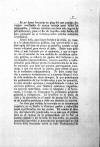
|
6.
January 1, 1917.
"Manifiesto del Presidente Electo Don Emiliano
Chamorro," p. 6.
" . . . Es mi deseo
formular un plan del que puedan derivarse
resultados de mutua ventaja para todos los
interesados, y obtener también una base más
segura de procedimiento, para el fin de liquidar
toda deuda del país, poniendo así al Gobierno
sobre sólidos cimientos económicos. ¶ Ahora
bien, para hacer frente a la crisis, en cuanto a
la administración pública, hay que recurrir a
medios nada difíciles de poner en práctíca,
cuando existe buena voluntad para servir al
país. Entre esos arbitrios, el más indicado por
el momento, y que se impone con el carácter de
una medida de verdadera salvación pública, es
reducir los gastos del Gobierno a las
necesidades imprescindibles, recurso sencillo e
indispensable para obtener pronto la disminución
de la deuda nacional, que debe ser nuestra
preocupación constante, y que nos abrirá la
puerta para entrar al goce de la verdadera
independencia. No debe costar mucho a nuestros
sentimientos ni a nuestras ideas el vivir la
vida modesta de otros tiempos, la que
practicaron los prohombres de los treinta años,
y que les permitió, no sólo atender oportuna y
cumplidamente a todos los servicios públicos,
sino también establecer importantes mejoras
materiales, como el telégrafo y el ferrocarril,
y fundar en Nicaragua la enseñanza primaria
gratuita y obligatoria. La sencillez en el modo
de vivir y la elevación en el modo de pensar fué
la divisa de aquellos patricios y debe ser
también la nuestra. ¶ La obra que realiza la
economía no es meramente negativa, no se limita
a eliminar gastos y reducirlos hasta
equilibrarlos con las rentas. En cuanto al
ahorro, discretamente practicado, no es más que
el primer paso en el camino de la prosperidad;
así lo fué en nuestro pasado y así lo será, no
hay duda, en nuestro inmediato porvenir; y para
que esa prosperidad no sea ficticia debe
descansar sobre la base fundamental de . . . "
|
|
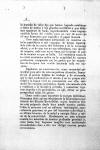
|
7.
January 1, 1917.
"Manifiesto del Presidente Electo Don Emiliano
Chamorro," p. 7.
" . . . la
moneda de valor fijo que hemos logrado
establecer a costa de tantos y tan grandes
sacrificios y que debemos mantener de modo
inquebrantable como imprescindible factor del
crédito para no caer de nuevo en el caos
financiero que engendra el papel moneda. ¶ Pero
nada habremos adelantado en nuestros anhelos
patrióticos si nos cruzamos de brazos
esperándolo todo de la acción del Gobierno y de
la economía oficial, y si de una vez no nos
esforzamos, con decidido empeño, cada uno en su
línea, por levantar al país de la escasez en que
se halla. La verdadera causa de la crisis
económica radica en la exigüidad de nuestra
producción, comparada con los gastos que las
exigencias de la época han venido haciendo cada
vez mayores. ¶ Impónese, en consecuencia, como
necesidad primordial para salir de esta
angustiosa situación, fomentar en el pueblo
hábitos de trabajo y de economía, que le den
confianza en sí mismo y en su propia actividad y
lo hagan vivir en consonancia con ella:
estimular las energías nacionales, dando
nuevamente vida y confianza a la iniciativa
privada, y comunicar vigoroso impulso a la
agricultura, en que cifran su prosprosperidad
todos los países. ¶ Como medio para mantenar la
energía individual, Nicaragna debe apoyar
eficazmente la humanitaria institución del
filántro Rockefeller, cuyos benéficos frutos
está palpando desde hace meses nuestro pueblo.
Todos la miramos cual un esfuerzo inestimable,
esencialmente generoso, en pro del bienestar
individual y, en último término, de la salud y
energía física y moral de la colectividad.
Rindámosla en esta solemne ocasión las muestras
de nuestra profunda gratitud y, como hasta hoy,
hagamos tangible este sentimiento secundándola
como a ello nos obliga nuestra propia
conveniencia. . . . "
|
|
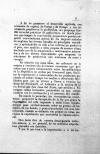
|
8.
January 1, 1917.
"Manifiesto del Presidente Electo Don Emiliano
Chamorro," p. 8.
" . . . A fin de
promover el desarrollo agrícola, con economía de
capital, de fuerza y de tiempo y con incremento
positivo en la producción, me propongo fundar
escuelas prácticas de agricultura, en donde
jóvenes que tengan la conveniente preparación
puedan adquirir conocimientos acerca de los
mejores métodos de explotar las tierras, basados
en principios científicos, y aplicándolos no
sólo a los cultivos ya usados en el país, sino
también a otros propios de nuestro clima,
haciendo uso de la maquinaria e instrumentos
adecuados y de los abonos convenientes que
aseguren un máximum de producción con mínimum de
costo y energía. ¶ En relación con estas ideas,
me esforzaré en la mejora y construcción de
buenas carreteras que permitan una segura
comunicación entre las poblaciones de la
República no unidas por ferrocarril para
facilitar la exportación o intercambio de los
productos, poniendo al mismo tiempo los medios u
ofreciendo facilidades para que se inicien y
lleven a término las obras del ferrocarril al
Atlántico y la mejora de la vía fluvial por San
Juan del Norte, que abrirán a Nicaragua vastos
horizontes poniéndola en más íntima contacto con
la civilización y el comercio del mundo. ¶ En
cuanto lo permitan las circunstancias económicas
propondré la derogación de la ley que grava la
exportación del café, impuesto a todas luces
injusto, porque pesa exclusivamente sobre un
gremio en beneficio de los demás, y pena al
productor con una contribución, cuando se
estimula con primas en otras naciones la
exportación que acrecienta la riqueza nacional.
¶ Otro tanto diré de nuestra desamparada
inductria minera, y, en general, de los
artículos exportables gravados con derechos. ¶ Y
por lo que toca a la importación y a los im- . .
. "
|
|
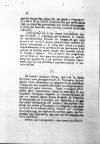
|
9.
January 1, 1917.
"Manifiesto del Presidente Electo Don Emiliano
Chamorro," p. 9.
" . . . puestos
decretados sobre ella, me declaro francamonte a
favor de la Tarifa Proteccionista, por medio de
la cual se eviten los gravámenes que recaen
directamente sobre las materias que necesita
nuestra incipiente industria. ¶ Como protección
a las clases trabajadoras, trataré de abolir o
restringir, por lo menos, el sistema de
reclutamientos forzosos en tiempo de paz para
proveer al servicio de las guarniciones, sistema
impuesto únicamente a la clase más pobre y a
quien inopinadamente se la arrebata de sus
quehaceres y del seno de su familia, quizá
cuando ésta necesita más de su trabajo y amparo.
Con el interés del magistrado que reclama el
bien para sus gobernados, os pediré, pues, que
pongáis fin a esa práctica inhumana elaborando
una ley que distribuya equitativamente el
servicio militar. ¶ El tratado Chamorro-Bryan,
que tuve la honra de firmar como
plenipotenciario de Nicaragua, ha producido
cierto rozamiento con algunas de las repúblicas
vecinas que han supuesto afectados sus derechos
territoriales por aquel convenio. Como considero
infundadas tales suposiciones, tengo la
seguridad de que los países hermanos llegarán al
convencimiento de que en manera alguna hemos
abrigado la intención de menoscabar en lo mínimo
sus derechos y de que una mejor inteligencia del
asunto y del espíritu fraternal que anima a
Nicaragua con respecto a las otras secciones de
la antigna patria, disipará por completo los
recelos que, sin motivos de nuestra parte, ha
despertado una negociación que será provechosa
para las cinco repúblicas. ¶ Estimo, por
consiguiente, como pasajeras diferen- . . . "
|
|
|
|
